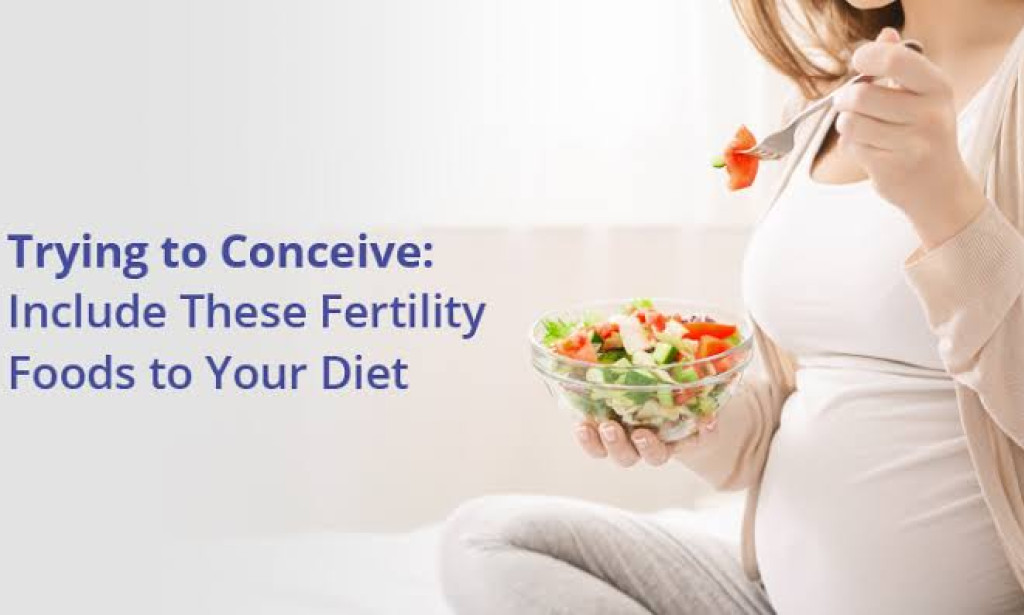Given that many couples experience difficulties becoming pregnant, improving fertility through nutrition is a topic of great interest and inquiry. Although there isn't a miracle food that can increase fertility, eating a diet high in specific nutrients can help men and women's reproductive health.
Foods high in antioxidants, iron, calcium, and folate are frequently thought to improve fertility. Leafy greens, beans, nuts, seeds, citrus fruits, whole grains, and lean meats like fish and chicken are a few examples.This is a thorough guide on foods that may enhance fertility:
1.Leafy Greens: As a B vitamin that is essential for reproductive health, folate is abundant in leafy greens including spinach, kale, and Swiss chard. Folate plays a part in DNA synthesis and repair as well as the creation of healthy eggs and sperm. If a woman gets enough folate before getting pregnant, her child's chance of developing neural tube abnormalities may be lower. Furthermore, folate has the potential to enhance the quality of sperm in men, which is why leafy greens are a crucial part of a diet that promotes fertility.
2.Berries: Antioxidants including vitamin C, anthocyanins, and flavonoids are abundant in berries like strawberries, blueberries, and raspberries. Free radicals, which can harm cells and have an impact on fertility, are countered by antioxidants in the body. Berries have the potential to enhance reproductive health in both men and women by mitigating oxidative stress. Research have demonstrated that antioxidants can improve the quality of sperm and shield eggs from harm, improving the likelihood of a successful conception.
3.Avocado: High in fiber, vitamins, minerals, and good fats, avocados are a fruit that is packed with nutrients. It has monounsaturated fats—oleic acid, in particular—that are good for hormone balance and cardiovascular health. Additionally, avocados are a good source of vitamin E, an antioxidant that can boost fertility by shielding reproductive cells from oxidative stress. Avocados are high in nutrients and may benefit reproductive health as well as general well-being.
4.Fatty Fish:Omega-3 fatty acids, in particular EPA (eicosapentaenoic acid) and DHA (docosahexaenoic acid), are abundant in fatty fish, such as salmon, mackerel, and sardines. These fats are vital to the health of the reproductive system and contain anti-inflammatory qualities. Omega-3 fatty acids may aid in hormone regulation and ovulation promotion in females. By increasing sperm motility, count, and morphology in males, they may raise the quality of their sperm. For couples who are attempting to conceive, including fatty fish in their diet may be advantageous.
5.Nuts and Seeds: Rich in nutrients, nuts and seeds have numerous health advantages, including increased fertility. They are abundant in fiber, protein, vitamins, minerals, and good fats. Because of their high levels of omega-3 fatty acids, zinc, and selenium, almonds, walnuts, flaxseeds, and chia seeds are particularly good for fertility. Nuts and seeds are a great complement to a diet that promotes conception since they contain nutrients that help with sperm production, hormone balance, and egg quality.
6.Legumes: Plant-based sources of protein, fiber, and other nutrients include legumes like lentils, chickpeas, and beans. They include high concentrations of zinc, iron, and folate—all of which are critical for fertility. Iron facilitates the movement of oxygen and the generation of energy, whereas folate is required for the synthesis of DNA and cell division. Zinc is essential for the formation of sperm and the control of hormones. Legumes can enhance fertility results and optimize reproductive function when consumed in the diet.
7.Full-Fat Dairy: Saturated fats found in full-fat dairy products, including as milk, yogurt, and cheese, have been linked to better reproductive results as compared to low-fat dairy products. The synthesis of all hormones, including sex hormones like estrogen and testosterone, depends on saturated fats. Furthermore, calcium and vitamin D, which are critical for healthy bones and may also affect fertility, are found in full-fat dairy products. Due to its high calorie content, full-fat dairy products should be consumed in moderation, yet doing so can improve reproductive health.
8.Whole Grains: Barley, quinoa, brown rice, oats, and other whole grains are great providers of fiber, vitamins, and minerals as well as complex carbs. They supply long-lasting energy and encourage fullness, both of which are critical for preserving a healthy weight, which has an effect on fertility. B vitamins, which are crucial for healthy reproduction and include folate and vitamin B6, are also found in whole grains. Couples can support their reproductive objectives and enjoy tasty, nutrient-dense meals by include whole grains in their diet.
9.Pomegranate: Studies have demonstrated the positive effects of pomegranate antioxidants, especially punicalagins and anthocyanins, on fertility. Pomegranate juice has been shown in studies to reduce oxidative stress and increase sperm motility and viability, which may improve sperm quality. Pomegranate juice or extract may assist women in controlling their menstrual cycles and encouraging ovulation. Pomegranates can be a delightful approach to enhance fertility whether added to a diet or consumed as juice.
A balanced and diverse diet is necessary for general health and fertility in addition to these particular foods. In addition, it's critical to maintain a healthy weight, control stress, stay hydrated, and limit coffee and alcohol consumption. In order to create a customized food plan that supports their reproductive objectives, couples who are trying to conceive might find it helpful to speak with a healthcare professional or nutritionist. Couples can improve their chances of a successful conception and a healthy pregnancy by choosing nutritious foods and leading healthy lifestyles.

You must be logged in to post a comment.